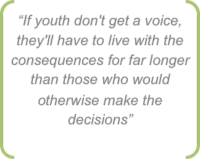Morgan Watkins
Morgan Watkins wants to use civic participation to make a difference in his community. He is a Wellington City Youth Councilor, a member of the Ministry of Youth Development’s Youth Advisory Group, and participated in the 2011 New Zealand Model United Nations. Morgan enjoys writing, reading and grabbing a coffee with friends on Friday nights at Wellington establishment Fidel’s.
What do you think it means to be a New Zealander in the 21st century?
One of the hard things about answering this question is the simple fact that individual meaning varies from person to person and is coloured by their experiences. Because New Zealand is so multi-cultural I don’t think there is any overriding meaning that we can attribute to all people. However, because of that, it could be safely said that New Zealanders are typically quite tolerant and accepting of cultural difference – or at least don’t oppose it.
What do you think are the major issues facing youth today and in the next 20 years?
I think one of the major hurdles facing youth in New Zealand is acceptance by the older generation as being adults. Of course some people aren’t responsible, but with media portrayal the stereotype is often better known than anything else. This leads to increased rates of incarceration, which itself leads to increased recidivism, and does little but perpetuate the myth. In the near future, however, there are issues such as how to control the world debt, how to solve climate issues, to combat world poverty, and others. There may be no solutions to these. And none of this even begins to consider the minor things like how to pay off the very necessary student loans in a jobless economy, or how to own a home when many properties are owned by older people, in addition to regular concerns like paying the rising costs of commodities.
Why do you think youth should vote?
If young people do not vote now, they will not be represented. And if they are not represented, they will have to deal with the current decisions made by the older generations. I think it is too much to hope that the current decisionmakers will magically stop making mistakes in regard to future-proofing New Zealand – and since the electorate vote them in, then the demographics of the participating electorate need to be changed so that policy reflects a change in voter interest.
Why do you think it is important for youth to engage with the referendum?
As above; if youth don’t get a voice in they’ll have to live with the consequences for far longer than those who would otherwise make the decisions. We can’t just say it’s not our problem because it is. Whether or not we live under a bicameral system or first past the post or mixed-member proportional, the way we structure governance matters. With good governance comes better representation and thus better accountability for our politicians. Without good representation, what are the people?



